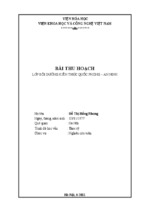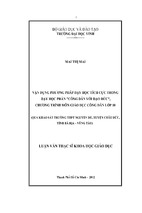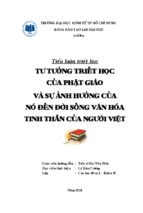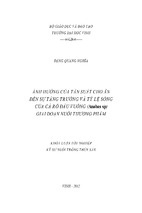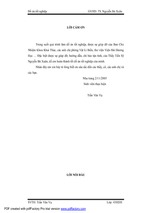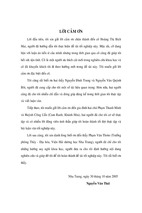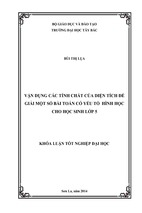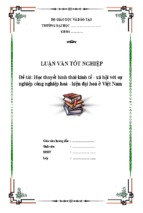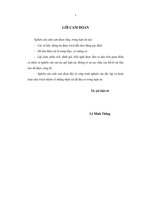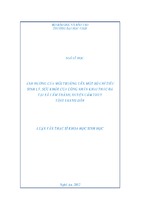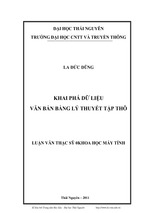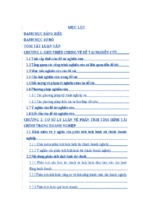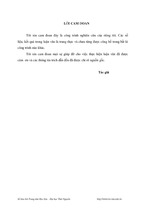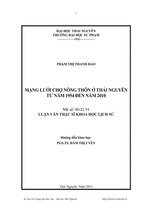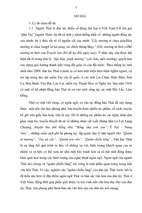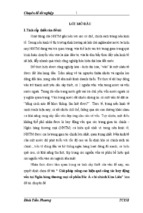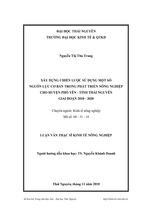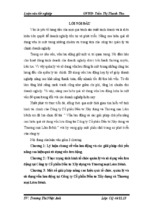BỘ GIÁO DỤC VÀ ĐÀO TẠO
TRƯỜNG ĐẠI HỌC QUẢN LÝ VÀ CÔNG NGHỆ HẢI PHÒNG
-------------------------------
KHÓA LUẬN TỐT NGHIỆP
NGÀNH : NGÔN NGỮ ANH
Sinh viên : Trần Thị Thanh Hòa
HẢI PHÒNG – 2021
BỘ GIÁO DỤC VÀ ĐÀO TẠO
TRƯỜNG ĐẠI HỌC QUẢN LÝ VÀ CÔNG NGHỆ HẢI PHÒNG
-----------------------------------
A STUDY ON MOTIVATIONAL FACTORS
AFFECTING FIRST-YEAR NON-ENGLISH
MAJORED STUDENTS IN LEARNING ENGLISH
VOCABULARY AT HAIPHONG MANAGEMENT AND
TECHNOLOGY UNIVERSITY
KHÓA LUẬN TỐT NGHIỆP ĐẠI HỌC HỆ CHÍNH QUY
NGÀNH: NGÔN NGỮ ANH
Sinh viên
Giảng viên hướng dẫn
: Trần Thị Thanh Hòa
: Thạc sỹ Nguyễn Thị Thu Hương
HẢI PHÒNG – 2021
BỘ GIÁO DỤC VÀ ĐÀO TẠO
TRƯỜNG ĐẠI HỌC QUẢN LÝ VÀ CÔNG NGHỆ HẢI PHÒNG
--------------------------------------
NHIỆM VỤ ĐỀ TÀI TỐT NGHIỆP
Sinh viên: Trần Thị Thanh Hòa
Lớp
: NA1901A
Ngành
: Ngôn Ngữ Anh
Mã SV: 1512751033
Tên đề tài: A study on motivational factors affecting first-year non- English majored
students in learning English vocabulary at Hai Phong Management and Technology
University.
NHIỆM VỤ ĐỀ TÀI
1. Nội dung và các yêu cầu cần giải quyết trong nhiệm vụ đề tài tốt nghiệp
………………………………………………………………………………….
………………………………………………………………………………….
………………………………………………………………………………….
………………………………………………………………………………….
………………………………………………………………………………….
………………………………………………………………………………….
2. Các tài liệu, số liệu cần thiết
………………………………………………………………………………….
………………………………………………………………………………….
………………………………………………………………………………….
………………………………………………………………………………….
………………………………………………………………………………….
………………………………………………………………………………….
3. Địa điểm thực tập tốt nghiệp
………………………………………………………………………………….
CÁN BỘ HƯỚNG DẪN ĐỀ TÀI TỐT NGHIỆP
Họ và tên
: Nguyễn Thị Thu Hương
Học hàm, học vị
: Thạc Sĩ
Cơ quan công tác
: Trường Đại học Quản lý và Công nghệ Hải Phòng
Nội dung hướng dẫn: A study on motivational factors affecting first-year nonEnglish majored students in learning English vocabulary at HaiPhong
Management and Technology University.
Đề tài tốt nghiệp được giao ngày 11 tháng 10 năm 2021
Yêu cầu phải hoàn thành xong trước ngày 31 tháng 12 năm 2021
Đã nhận nhiệm vụ ĐTTN
Đã giao nhiệm vụ ĐTTN
Sinh viên
Giảng viên hướng dẫn
TRẦN THỊ THANH HÒA
NGUYỄN THỊ THU HƯƠNG
Hải Phòng, ngày.… tháng… năm 2021
XÁC NHẬN CỦA KHOA
CỘNG HÒA XÃ HỘI CHỦ NGHĨA VIỆT NAM
Độc lập - Tự do - Hạnh phúc
PHIẾU NHẬN XÉT CỦA GIẢNG VIÊN HƯỚNG DẪN TỐT NGHIỆP
Họ và tên giảng viên:
...........................................................................................
Đơn vị công tác:
...........................................................................................
Họ và tên sinh viên:
..................................... Chuyên ngành: ............................
Nội dung hướng dẫn:
.......................................................... ................................
....................................................................................................................................
1. Tinh thần thái độ của sinh viên trong quá trình làm đề tài tốt nghiệp
...................................................................................................................................
....................................................................................................................................
....................................................................................................................................
....................................................................................................................................
....................................................................................................................................
....................................................................................................................................
2. Đánh giá chất lượng của đồ án/khóa luận (so với nội dung yêu cầu đã đề ra
trong nhiệm vụ Đ.T. T.N trên các mặt lý luận, thực tiễn, tính toán số liệu…)
...............................................................................................................................
...............................................................................................................................
...............................................................................................................................
...............................................................................................................................
...............................................................................................................................
...............................................................................................................................
...............................................................................................................................
3. Ý kiến của giảng viên hướng dẫn tốt nghiệp
Được bảo vệ
Không được bảo vệ
Điểm hướng dẫn
Hải Phòng, ngày … tháng … năm ......
Giảng viên hướng dẫn
(Ký và ghi rõ họ tên)
QC20-B18
CỘNG HÒA XÃ HỘI CHỦ NGHĨA VIỆT NAM
Độc lập - Tự do - Hạnh phúc
PHIẾU NHẬN XÉT CỦA GIẢNG VIÊN CHẤM PHẢN BIỆN
Họ và tên giảng viên:
..............................................................................................
Đơn vị công tác:
........................................................................ .....................
Họ và tên sinh viên:
...................................... Chuyên ngành: ..............................
Đề tài tốt nghiệp:
......................................................................... ....................
............................................................................................................................
............................................................................................................................
1. Phần nhận xét của giáo viên chấm phản biện
.....................................................................................................................................
.....................................................................................................................................
.....................................................................................................................................
.....................................................................................................................................
.....................................................................................................................................
2. Những mặt còn hạn chế
.............................................................................................................................................
.............................................................................................................................................
.....................................................................................................................................
.....................................................................................................................................
.....................................................................................................................................
3. Ý kiến của giảng viên chấm phản biện
Được bảo vệ
Không được bảo vệ
Điểm hướng dẫn
Hải Phòng, ngày … tháng … năm ......
Giảng viên chấm phản biện
(Ký và ghi rõ tến)
QC20-B19
TABLE OF CONTENTS
ACKNOWLEDGEMENTS
PART I: INTRODUCTION ............................................................................... 1
1. Rationale of the study........................................................................................ 1
2. Aims of the study .............................................................................................. 1
3. Research Questions ........................................................................................... 2
3.1. What are the factors affecting first – year non – English majors’ motivation
in learning vocabulary? ......................................................................................... 2
3.2. What are suggestions to motivate first – year non – English majors to learn
English vocabulary? .............................................................................................. 2
4. Significance of the study ................................................................................... 2
5. Scope of the study ............................................................................................. 2
6. Method of the study........................................................................................... 2
7. Designs of the study .......................................................................................... 2
PART 2: DEVELOPMENT ............................................................................... 4
CHAPTER 1: LITERATURE REVIEW .......................................................... 4
1.1. Theoretical background of motivation ........................................................... 4
1.1.1. Definition of motivation .............................................................................. 4
1.1.2. Types of motivation .................................................................................... 5
1.1.3. Importance of motivation in second language learning .............................. 6
1.2. Theoretical background of vocabulary .......................................................... 7
1.2.1. Definition of vocabulary ............................................................................. 7
1.2.2. Types of vocabulary .................................................................................... 9
1.2.3. The importance of vocabulary .................................................................. 10
1.3. Motivation in learning vocabulary ............................................................... 10
1.3.1. Importance of motivation in learning vocabulary ..................................... 10
1.3.2. Factors affecting students’ motivation in learning vocabulary ................. 11
1.3.2.1. Students’ factors ..................................................................................... 11
1.3.2.2. Teachers’factors ..................................................................................... 14
1.3.2.3. Environmental factors ............................................................................ 16
CHAPTER 2: RESEARCH METHODOLOGY ........................................... 17
2.1. Setting of the study ....................................................................................... 17
2.2. Subjects ........................................................................................................ 17
2.3. Learning materials ........................................................................................ 17
2.4. Instruments ................................................................................................... 18
2.5. Data collection and data analysis ................................................................. 18
3.1. Data analysis ................................................................................................ 19
3.1.1. Demographic information ......................................................................... 19
3.1.2. Factors affecting non-English majored freshmen in learning vocabulary 20
3.1.2.1. Students’ factors ..................................................................................... 20
3.1.2.2. Teachers’ factors .................................................................................... 22
3.2. Findings and suggestions ............................................................................. 25
3.2.1. Findings ..................................................................................................... 25
3.2.2. Suggested solutions ................................................................................... 26
3.2.2.1. Suggested solutions for the university ................................................... 26
3.2.2.2. Suggested solutions for students ............................................................ 27
3.2.2.3. Suggested solutions for teachers ............................................................ 28
PART III: CONCLUSION ............................................................................... 29
REFERENCES .................................................................................................. 30
APPENDIX 1 ..................................................................................................... 32
APPENDIX 2 ................................................................................................... 336
ACKNOWLEDGEMENTS
During the process of doing this graduation paper, I have received a lot
of help, encouragement and experiences from teachers and friends.
First of all, my special thanks are also extended to all the lecturers of the
Department of Foreign Languages, Haiphong Management and Technology
University who have educated and provided me the knowledge and experience
throughout the years of my study in this program.
Secondly, I would like to express my deepest gratitude to my supervisor
Ms. Nguyen Thi Thu Huong, the lecturer of foreign language faculty, Haiphong
Management and Technology University, for my whole-hearted guidance and
support. Without her valuable recommendations and advice, I could not finish
this thesis successfully.
Lastly, special thanks and love to my family who always beside and gave
their encouragement and support in my education and every other aspect of life.
Hai Phong, December 2021
Student
PART I: INTRODUCTION
1. Rationale of the study
In the process of globalization, learning a foreign language for anyone is
very necessary. However, mastering a foreign language like English is not easy
as some people think. Apart from four basic skills including listening, speaking,
reading and writing, each learner has to learn its complicating grammar and a lot
of vocabulary.
For most Vietnamese students, English grammar is not really
their big problem, however, vocabulary is different. They often lack words to
read, listen, write and speak. Although words are important, they always find
difficult to get motivation to learn them. HPU non- English majored freshmen
are no exception. They often complain about having poor vocabulary due to
demotivation in learning it. According to them, there are many reasons for the
demotivation. They can come from leaners, teachers, learning environment or
even English itself.
With the hope of increasing students’ motivation in vocabulary English
learning, I have chosen “A study on motivational factors affecting first-year
non- English majored students in learning English vocabulary at Hai Phong
Management and Technology University” for my thesis paper. I hope that the
study will enable leaners to study new words more effectively and help English
teachers find suitable teaching methods to help students be more interested in
vocabulary lessons.
2. Aims of the study
The purposes of the study is to investigate the factors affecting motivaton
in learning vocabulary among the first-year non-English major students at Hai
Phong Management and Technology University. The principal purposes of the
study are summarized as follows:
- To investigate factors affecting learners’ motivation in vocabulary
lessons.
1
- To suggest some methods to motivate students to learn English
vocabulary.
3. Research Questions
The study was carried out in order to find the answers to two research
questions:
3.1. What are the factors affecting first – year non – English majors’
motivation in learning vocabulary?
3.2. What are suggestions to motivate first – year non – English majors to
learn English vocabulary?
4. Significance of the study
The study is significant for the following reasons. Firstly, it helps first-year
non-English majors minimize their demotivation in learning English vocabulary.
Thus, they get involved more in vocabulary lessons and learn new words more
effectively. Secondly, it helps teachers have more appropriate teaching methods
to increase their students’ motivation.
5. Scope of the study
The research only focuses on motivational factors including leaner- related
factors, teacher- related factors and learning environment that have impact on
non – English freshmen in English vocabulary learning.
6. Method of the study
In seeking answers to the research questions, survey questionnaire and
interview were chosen to obtain relevant information for the study. The method
of the study is quantitative one.
7. Designs of the study
The thesis consists of three parts: Introduction, Development and
Conclusion.
The Introduction provides the basic information such as the rationale of the
study, aims, research questions, signficance, scope and method of the study.
The main content includes three chapters: Chapter 1: Literature Review,
conceptualizes the nature of vocabulary, motivation and factors affecting
2
students’ motivation in learning vocabulary. Chapter 2: Research Methodology
presents the methodology used in the study. Chapter 3: Data Analysis covers a
comprehensive analysis on the data collected from the survey.
The Conclusion is a review of the study, future directions for further
research and limitations of the study.
3
PART 2: DEVELOPMENT
CHAPTER 1: LITERATURE REVIEW
1.1. Theoretical background of motivation
1.1.1. Definition of motivation
Motivation plays an important role in the process of English learningteaching. According to Dornyei (2001), motivation is one of the most important
factors that influences the rate and success of second language learning.
Most definitions of motivation reflect the consensus that motivation is an
internal state or condition that serves to activate or energize behavior. Woolfolk
(2001:366) states that "motivation is an internal state that arouses directs and
maintains behavior". Sharing the same point, Brown (2000:160) suggests that
"motivation is some kind of internal drove which pushes someone to do things in
order to achieve something". Williams and Burden (1997:119) also point out
that the reason for and factors affecting your choice of behaving in this way but
not in others and how much effort you decide to make in order to obtain your
objects are all aspects relating to motivation.
Motivation
also
refers
to
the need
and
desire. According
to
Lightbown&Spada (1999:6) state that motivation in second language learning is
a complex phenomenon which can be defined in terms of two factors: learners'
communicative needs and their attitudes towards the second language
community. If learners need to speak the second language in a wide range of
social situations or to fulfill professional ambitions, they will perceive the
communicative value of the second language and will therefore be motivated to
acquire proficiency in it. Likewise, if learners have favorable attitudes towards
the speakers of the language, they will decide more contact with them.
Baron (1996) defines motivations as “the internal process that can’t be
directly observed but that activates, guides and maintains overt behavior”. Wade
& Tavris (1998) propose, “Motivation is an inferred process within a person,
which cause that organism to move toward a goal or away from an unpleasant
4
situation”, whereas Woolfolk (2004) points out, “Motivation is an internal state
that arouses, directs, and maintains behavior”. Fernald & Fernald (2005) refer
to motivation as “Inner influence on behaviour as represented by physiological
condition, interests, attitudes, and aspirations”. According to Macintyre et al.,
(2001), motivation is defined as an attribute of the individual describing the
psychological qualities underlying behaviour with respect to a particular task.
This goal-directed behavior shows itself through distinct actions of the
motivated individual. Gardner (1985), motivation is the combination of attempt
plus desire to obtain the aim of learning the language plus favorable attitudes
toward learning the language. Oxford and Shearin (1994) defined motivation as
a desire to gain an objective, combined with the energy to work towards that
objective. Narayanan (2006) said that motivation is the reason or reasons behind
one's actions or behaviors. Motivation is the reasons underlying behavior (Guay
et al., 2010). Broussard and Garrison (2004) defined motivation as the attribute
that moves us to do or not to do something.
1.1.2. Types of motivation
There are many different kinds of motivation:
- "Intrinsic": the urge to engage in the learning activity for its own sake. It
has been termed "cognitive drive", very typical of young children and tends to
deteriorate with age. Intrinsic motivation "comes from the individual" (Harmer,
2001:51) or "stems from factors such as interest or curiosity" (Woolfolk,
2001:368).
- "Extrinsic": motivation that is derived from external incentives. Extrinsic
motivation, on the other hand, derives from an anticipation of rewards such as
praise, awards, prizes, and evaluation and fear for punishment as extrinsically
motivated students does the activity itself, and this kind of motivation refers to
learning situations where the reason for doing a task is something other than an
interest in the task itself by Williams & Burden (1997:40).
5
- "Situational": Brown (1987), (cited in Ur, 1996:276) states that situational
motivation refers to the learning context: classroom, total environment which is
assumed to be influenced by teacher action.
- "Task":
In some learning situations, many learners' reason for learning a foreign
language is not because of the interest in the culture and target language
community but the interest in learning tasks. They may find the kind of learning
activities enjoyable and become productively engaged in learning tasks, and
sustain that engagement. In other words, these learners are intrinsically
motivated (Ellis, 1997:76).
Brown (1987) (cited in Ur, 1996:276) also states that task motivation
occurs when learners are encouraged to invest efforts and energy in doing a
particular task attractively designed by the teacher and they succeed.
- "Resultative":
Ellis (1997:76) claims that "motivation is the result of learning. Learners
who experience success in learning may become more, or in some contexts, less
motivated to learn". Truly, in some contexts like Vietnam, success in learning
Korean may intensify Vietnamese students' liking for Korean culture, and thus,
stimulates them to learn more.
Among them, intrinsic and extrinsic motivations have an important part to
play in classroom settings. Most writers agree that intrinsic and extrinsic interact
with each other. As a result, learners can be either motivated by internal or
external factors depending on the circumstances and conditions the activity is
performed.
1.1.3. Importance of motivation in second language learning
Learner motivation has become more and more commonly recognized as
one of the major defining factors for success in learning English. Motivation
affects the extent of active, personal involvement in second language learning.
Reece & Walker (1997) express that “motivation is a key factor in the
second language learning process”. They stressed that a less able student who is
6
highly motivated can achieve greater success than the more intelligent student
who is not well motivation. Among the things that do clearly affected mastery
of a second language is the kind of motivation that a learner has Finegan
(1994:466).
Harmer (1999: 51) confirms that "it is accepted for most fields of learning
that motivation is essential to success”
1.1.4. Charactertics of motivated learners
Actually, the term motivation on its own is rather difficult to define. It is
easier and more useful to think in terms of the "motivated learner". Motivated
learners are those who participate willingly and actively in learning activities in
class.
Crookes and Schmidt (1989) (cited in Ellis, 1997:42) describe a motivated
student as someone "becomes productively engaged on learning tasks, and
sustains that engagement, without the need for continual encouragement or
direction".
Additionally, Lightbown and Spada (1999:57) state that motivated students
are usually those who participate actively in class, express interest in the
subject-matter, and study a great deal.
1.2. Theoretical background of vocabulary
1.2.1. Definition of vocabulary
A vocabulary is defined as "all the words known and used by a particular
person" and “all the words which exist in a particular language or subject”
(Cambridge advanced learners dictionary).
Vocabulary is knowledge of words and word meanings. However,
vocabulary is more complex than this definition suggests. First, words come in
two forms: oral and print. Oral vocabulary includes those words that we
recognize and use in listening and speaking. Print vocabulary includes those
words that we recognize and use in reading and writing. Second, word
knowledge also comes in two forms, receptive and productive. Receptive
vocabulary includes words that we recognize when we hear or see them.
7
Productive vocabulary includes words that we use when we speak or write.
Receptive vocabulary is typically larger than productive vocabulary, and may
include many words to which we assign some meaning, even if we don‟t know
their full definitions and connotations – or ever use them ourselves as we speak
and write (Kamil & Hiebert).
Besides, according to Webster’s Dictionary (1993,327) “ Vocabulary is a
list or group of words and phrase, usually in alphabetical order”.
According to Nation (1990) and Taylor (1990), knowing a word involves
not knowing its spelling, morphology, pronunciation, meaning, or the equivalent
of the word in the learner's mother tongue but also knowing its collocations,
register, polysemy, and even its homonym.
In general, vocabulary is a component of language that maintains all of
information about meaning and using word in language. It is one of the
important factors in learning English besides sound system, grammar, and
culture. A vocabulary usually grows and evolves with age, and serves as a useful
and fundamental tool for communication and acquiring knowledge.
A word will be examined in details as followed:
* Form
Pronunciation and spelling: Each English word has its spelling and
pronunciation. Learners have to know all the spelling, pronunciation, and
irregularities of the word.
Grammar: Foreign language learners need some guidance on how to use
vocabulary accurately. They need to know the grammatical function, the
unpredictable change of form in certain contexts or some idiosyncratic ways of
connecting with other words in sentences, the regularity, and irregularity, the
singular and plural forms of the new words.
* Meaning
8
There are various kinds of meaning, which include denotational meaning,
connocational meaning, pragmatic meaning or appropriateness, and meaning
relationship. The meaning of a word is primarily what it refers to in the real
world, its denotation. This is often the sort of definition given in dictionaries.
* Use of word
The most important for students to learn a new word is to know how to use
it appropriately and effectively in different oral and written contexts or else it
may become a dead or forgettable word. In order to use a word well, they need
to know how to collocate it with other words correctly. Therefore, they should
put words into collocation.
1.2.2. Types of vocabulary
In general, vocabulary is divided into four types: listening vocabulary,
speaking vocabulary, reading vocabulary and writing vocabulary.
- Listening vocabulary: Listening vocabulary refers to the words we need to
know to understand what we hear. A person's listening vocabulary is all the
words he or she can recognize when listening to speech. This vocabulary is
aided in size by context and tone of voice.
- Speaking vocabulary: Speaking vocabulary consists of the words we use
in everyday speech. A person's speaking vocabulary is all the words he or she
can use in speech. According to Nation (1990-29), vocabulary is divided in the
specific reference, such a word.
- Reading vocabulary: Reading vocabulary is made up of the words in print
that we recognize or can figure out. This vocabulary refers to the words we
recognise when we read any text. The extent of students‟ vocabulary knowledge
relates strongly to their reading comprehension and overall academic success .
This relationship seems logical; to get meaning from what they read, students
need both a great many words in their vocabularies and the ability to use various
strategies to establish the meanings of new words when they encounter them.
- Writing vocabulary: Writing vocabulary consists of the words we use in
writing. A person's writing vocabulary is all the words he or she can employ in
9
writing. It is very easy to explain ourselves verbally by using facial expressions
and modulation of voice, but using the same words for communicating the same
concept or thought through writing is not that easy. Our writing vocabulary is
intensely affected by the words we can spell.
1.2.3. The importance of vocabulary
Vocabulary is the foundation of any language. Therefore, vocabulary
learning is an essential part in foreign language learning as the meanings of new
words are very often emphasized, whether in books or in classrooms. It is also
central to language teaching and is of paramount importance to a language
learner. Recent research indicate that teaching vocabulary may be problematic
because many teachers are not confident about best practice in vocabulary
teaching and at times don’t know where to begin to form an instructional
emphasis on word learning (Berne & Blachowicz, 2008).
In general, vocabulary plays an important role in the development of each
language, its importance is concluded in this list:
• An extensive vocabulary aids expressions and communication.
• Vocabulary size has been directly linked to reading comprehension.
• Linguistic vocabulary is synonymous with thinking vocabulary.
• A person may be judged by others based on his or her vocabulary.
1.3. Motivation in learning vocabulary
1.3.1. Importance of motivation in learning vocabulary
Most motivation theorists assume that motivation is involved in the
performance of all learned responses; that is, a learned behavior will not occur
unless it is energized. As a result, motivation affects the extent of active,
personal involvement in second language learning.
Obviously, unmotivated students are insufficiently involved and therefore
unable to develop their skills. Therefore, motivation is one of the main
determining factors in success in foreign or second language learning...
Harmer (1999:51) confirms that "it is accepted for most fields of learning
that motivation is essential to succeed”.
10
- Xem thêm -

